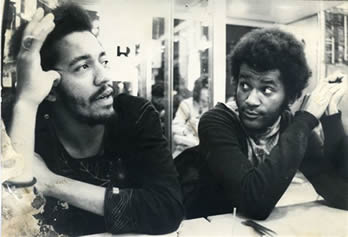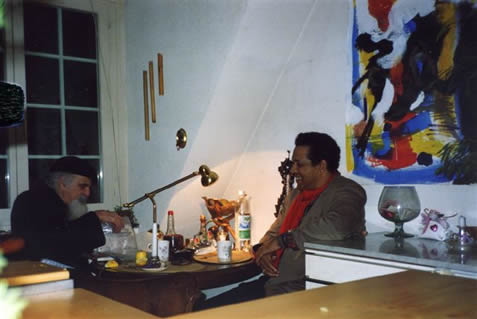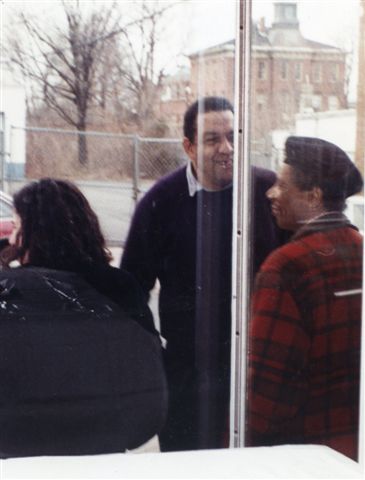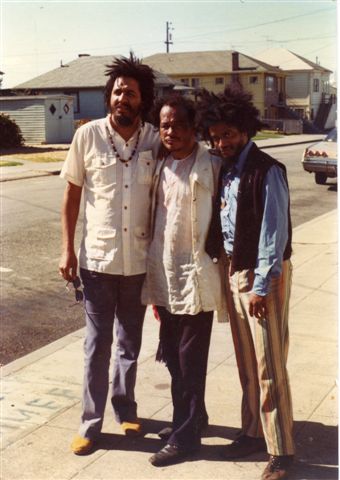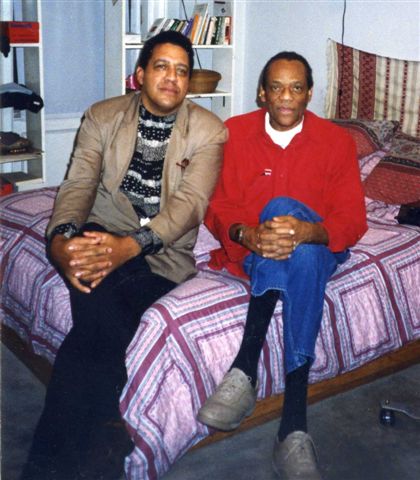| THE NEW TIMES HOLLER! Interviews KUNLE MWANGA |
July 20, 2007
Special for THE NEW TIMES HOLLER!
© Amir Bey, 2007
|
Kunle Mwanga and Anthony Braxton, Paris, 1972
With Tony Scott, “Two Clarinetists Talking Clarinet”; Photo: Esther Rusterholz, Zurich, Switzerland, Feb. 1992
Kunle with Leroy Jenkins, at The Buttonwood Tree, Middletown, CT, March, 1995
Kunle, Beat Poet Bob Kaufman, Amir Bey, Oakland, CA, April, 1975
Kunle with Julius Hemphill at Julius’s apartment, Xmas, 1993, New York City
Kunle Mwanga, cultural activist, producer, organizer, curator and clarinetist of that music often called Jazz, Great Black Music, and “The Music”, founder of Earth Art Productions, and co-founder with his brother, Nantambu, of The Mwanga Collection (of visual art) shares his views and insights about the current state of music, musicians, and his aims.
Holler!: How did you become involved in the music?
Mwanga: It was two-fold. My first involvement had to do with my work as a producer while I ran Liberty House in the West Village of New York starting in 1970. There, I produced a concert series that began my work as a producer. My actual involvement as a manager and booking agent came about while living in Paris. Without any conversation, I installed myself in the workings of the musical life of Anthony Braxton after attending a concert and listening to him respond to how he did not appreciate the fact that the producers of the concert did not do what they were suppose to with regard to the printing of a program. I decided to work with Anthony to make sure all the necessary particulars were taken care of from that point on.
It was instinctual. I then became his agent and manager from 1971 to 1974 in Paris. These were the beginnings of my involvement in the music business as a producer, manager and booking agent.
Holler!: You're from Chicago. When did you check out the AACM?
Mwanga: In 1965 when I returned home to Chicago from England after a 5 year stint in the US Air Force; it was the same year the AACM organized. I was immediately struck by the organizational quality and the 10 point program they developed for themselves. I was drawn immediately to their philosophy. I attended most of their concerts from that point on until I departed Chicago for New York in May of 1968. I produced the first AACM concert in New York at The Peace Church on West 4th Street with the Creative Construction Company, Braxton, Leroy Jenkins, Leo Smith & Steve McCall and Guests: Richard Davis and Muhal Richard Abrams.
Holler!: You've worked with many musicians and in many situations, The Art Ensemble of Chicago, Novella Nelson, David Murray, Ornette Coleman, Anthony Braxton, to name some. Is there a single or consistent concept in your work with people like that?
Mwanga: In most cases, outside of my interest in those persons who were with the AACM, I was affected by their performances and compositions and by their personalities. It was the communicative source between us that led me to feel an ability to work with them, particularly with Geri Allen and Ralph Peterson, Jr. and Michele Rosewoman. I was interested in making things happen, to grow and progress. There had to be a kind of understanding that gave me the ability to do my part in making things happen in a creative way while serving my artistic sensibilities. I wanted to be able to initiate ideas and concepts in how things happened. How situations moved both in terms physical and administrative movement. Many of those that I was able to manage and work with, I was able to initiate new ideas for them in their work. I felt very good being in the bands so to speak. I was just another instrument that performed off stage.
Holler!: You've been involved in the music for decades; how do you see the direction of the music over the time you began your work, and where do you see it going now?
Mwanga: It goes without saying that as we look at the industry from a kind of overview, my greatest feeling of disappointment has to do with the lack of control over what we do and how we do it. In my particular case, I was not able to hold on to the continued development working with most of the people named above. In most cases it seemed as if they moved towards other people to work with, people who had more money and power to be able to move them. I understood that, though it was my contention that we had to continue to develop our own power to move ourselves. And to do that takes time and development from within. It was always possible for those who have money and power, to move in and take over after we arrived at a certain point in our development, if we were vulnerable. However what happens is, we lose our ability to be in control of ourselves and therefore we lose power. Most of the people I’ve worked with, whereas I had the idea to develop strength from within, are working under someone else’s control. The industry is in control. Yet we could be that industry ourselves had we stayed in control of ourselves. The power within: having to do with management, producing concerts, recordings and all administrative work, worldwide.
Holler!: Over the years, musicians have been doing what Sun Ra began, producing their music on their own record labels, and taking other initiatives independently. Would you say that is developing the strength that you wish was there?
Mwanga: You could put that concept, of producing one’s own recordings along side that of ownership of one’s publishing company and say those are certainly major steps toward developing the proprietorship and control over ones music. However these two tools used towards that control has to be in synch with the overall concept of what one does with these tools. They have to move towards connecting with the public, one’s audience, with performance, with marketing, with distribution, etc. It was interesting to see the dawning of musicians making their own recordings back in the early 70's. It was seen as a very courageous step. Yet most wound up with closets of LPs because there was no distribution connection. I am not being critical. I admire those moves. However now that we have been able to scope out the industry's command and control over the entire system of the business, there is the need to make moves towards our being in control. The problem now is that here in the new century, we are less in touch with each other and find ourselves moving back further from being in control of ourselves. We may have to go back and re-group, re-organize, in order to make the necessary changes towards our future of being in control. I think the moves by Sonny Rollins, (Doxy and Carnegie Hall) and Ornette (Sound Grammar), these major players owning their music the way they do, is a grand one from the top.
Holler!: Aside from your work with others, what are some personal projects that you are involved in?
Mwanga: I have been working on my book for many years and I am trying to structure a period of time to really bring it to a close. It is taking a lot out of me to continue to work on it. I am also working as a volunteer on the board of directors of a grass-roots organization in Middletown, CT called The Buttonwood Tree. I book the musical events, I’m on their grants committee and I’m involved in trying to bring the community into the knowledge and understanding of how important culture is in our daily lives. It is hard to bring people inside when there is this umbrella of mainstream tactics that keep control over our children and adults in a way that harnesses their creativity. There is much work to be done.
Holler!: Many musicians feel it's more rewarding and there's more appreciation for them in places like Europe. Do you agree?
Mwanga: In Europe we have lost a lot. And of course it really depends on how you are looking at it whether you see it as a continent which is serving your particular interest as a musician. The history of music coming out of our African-American experience crossing into Europe was, to a large degree, a good and wholesome endeavor. It served us well for some decades. However, with the popularization and total control of the music in the hands of those who are enjoying the total exploitation of the music, serving no real interest to the musician, except to send them home, deeper into a well, as a non-entity in terms of any viable ability to make things happen for themselves, this is the dilemma.
I kind of witnessed that change first hand when I was living in Paris working with Braxton in early 1971-74. I saw the implementation of how we were losing, in so many ways, our ability to harness control of ourselves while we were on stage, not being able to garner control. This is one of the most important aspects of power over oneself: Control.
Holler!: Have there been any changes in the scene in Europe? I've heard that Europe is less dependent or interested in Jazz musicians from here at this time, that the level of music and musicians has grown there; what do you think?
Mwanga: Well, for sure Europe is not to blame for how it has moved and conquered. We should share a lot in our misunderstanding, as we continue to misunderstand our inability at how we perceive what we are here for and what we are doing. Music is an art form. The concept of Jazz is an art form. It is not owned. It can be performed by anyone who cares to put the time and energy into playing it. It is up to the individual to decide what he or she will do with their creativity. However it is up to the collective understanding of a family, a group, a neighborhood, a community, a race, a nation, a world to decide what they are doing and how they want to control themselves and what we create. That is, when we learn what the basis is in how we activate that control. To a large degree, we have given away most of our control and therefore when you go to Europe and you see very few African-American musicians performing, it is because Europeans made a conscious decision to take over the jazz terrain in their world. They could do it because they had control. It did not have to happen. However in order for it not to have happened we would have had to activate administrative function, legal function, and more stringent controls over and how what we do. All we were thinking about was playing music. All they were thinking about was controlling our music. There were and are lessons to be learned and there is much work to be done on our part.
Text: (c) 2007, The New Times Holler!/Kunle Mwanga
All Photos Used by permission: (c) The Mwanga Collection
Kunle Mwanga can be contacted by visiting his website at
http://www.earthartproductions.com
|
|
